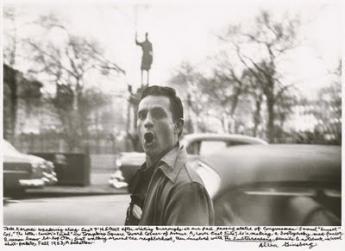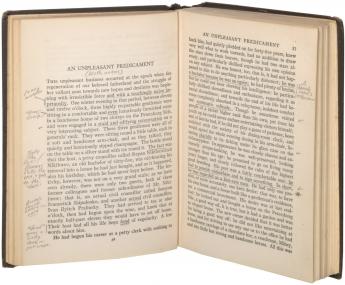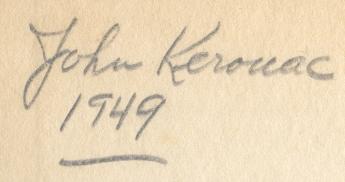Tip
When Kerouac Met Dostoyevsky

By Stephen J. Gertz
Sometime during March-April, 1949, John-not-yet-Jack Kerouac, 27 years old and living with his parents as "The Wizard of Ozone Park" (Queens, NYC), as his Beat friends referred to him, bought a cheap reprint edition of short stories by Fyodor Dostoyevsky. He annotated the book, and entered his ownership signature.
Dostoyevsky was an important influence on Kerouac; his novel,The Subterraneans, was consciously modeled on Dostoyevsky's Notes from Underground, one of his favorite books, and there are many references to the Russian author in Kerouac's novels and letters.
Dostoyevsky was something of a guiding literary and philosophical spirit to the Beats (and buddy - Kerouac affectionately called him "Dusty"), and Notes From the Underground, which Sartre considered to be a major forerunner of existentialism, a handbook of sorts for the Western Man isolated, apart from, and at odds with the culture in which he lives, alienated from the mainstream, an outsider creating and living life on his own terms. Notes from the Underground is the companion piece to Mezz Mezzrow's Really The Blues (1946), the gospel of hipster-jazz subculture that the Beats adopted as their book of revelations. The two books serve as the liturgy to Beat theology.
In 1949, the year that Kerouac bought this book, he had just completed the legendary road trips with Neal Cassady that began in July, 1947, wrote The Town and the City, was working onDr. Sax, and crafting the first draft of On the Road (in its essential religiosity a sort of Brothers Karamazov in a car; Kerouac, a devout, though lapsed Catholic; a lonely, fallen altar-boy on an odyssey seeking enlightenment, redemption and communion with the Godhead, Brother Cassady his co-pilot and navigator riding shotgun no matter where he sat. On the Road is not about getting kicks on Route 66. Kerouac is an Irish-Catholic Siddartha). 1949 was a key year in Kerouac's journey, and Dostoyevsky was heavily on his mind.
In a letter written to his friend Alan Harrington on April 23, 1949 Kerouac wrote: "I've just read 'An Unfortunate [sic] Predicament,' a long story by Dusty-what's-his-name. I studied it carefully and found that he begins with 'ideas' and then demolishes them in the fury of what actually becomes the story. This letter is a similar venture. However, nothing detracts from the fact that this is a mad letter. 'So be it! So be it!'"
And boy, did he so be it. The first two pages of An Unpleasant Predicament (1861), one of the stories in the collection, are annotated by Kerouac, who has written six remarks in the margins commenting on Dostoyevsky's usage and writing.
For example, next to the sentence that begins: "The fact..." Kerouac writes: "Truly 'the fact.' Always fluffs the rest, & gets to the 'fact.'"
Next to the word "fond" Kerouac writes: "fond always gives a batty tone -- just right."
About Dostoyevsky's use of the word "actual" he writes "Dusty's way of being a card."
Commenting on the sentence, "He was a bachelor because he was an egoist," Kerouac writes "A Family man's reflection."
Inappropriate behavior, scandalous activity, moral experimentation, ambiguity, and socio-political and literary polemic set within a mocking, carnivalistic atmosphere characterize this story of three generals' argument of ideas that degenerates when one of them, wishing to test his liberal-humanistic thinking, leaves, crashes the wedding of a subordinate, and gets drunk to satirically disastrous result. This was the Beat's bread and butter at its merriest, stepping on sacred cultural cow-pies, enjoying the squish, and hoping the scent offends bourgeois nostrils.
This copy of Dostoyevsky's short stories is a wonderful personal artifact from Kerouac's developing years as a writer, demonstrating his early literary thinking and roots. The year he bought and read it, the author, the subject - here dawn energetically breaks on the Beats and especially on Jack Kerouac.
Published on Booktryst (June 20, 2011) and presented here by permission of the author. Images from book courtesy of Between the Covers: (Kerouac, Jack). Dostoievski, Fiodor [Fyodor Dostoyevsky]. Short Stories. New York and Boston: Books, Inc., n.d. [c. 1940s]. Reprint edition. Octavo. 248 pp. Signed and dated by Kerouac, with his holograph margin annotations in pencil. Photo of Kerouac ©Allen Ginsberg LLC 2010, from Beat Memories: The Photographs of Allen Ginsberg. Courtesy of National Gallery of Art.
>>> Listen to Jack Kerouac recite a three-minute excerpt from The Subterraneans.


